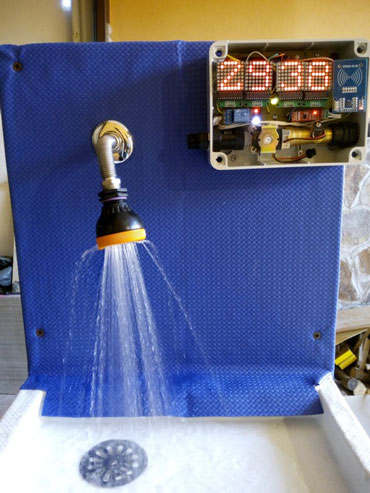Technical sheet
- Stillaquae: Description and features -
The winning move is not to 'discover the hot water', but to engage a technical quest and succeed in making it cost less ...
VERSIONS
Stillaquae LIBER
It's the stand-alone version.
The pre-registered key (TAG) keeps track of residual credit by storing data, so that the unit can work autonomously without a network connection to the main server.
Stillaquae LEGATUS
It is the version connected to a PC over a network
The TAG stores just the reference of the available creditm which is verified and controlled by dedicated PC software.
HOW IT IS MADE
STILLAQUAE, in both versions, is basically made of :
- an RFID reader with dedicated electronics and control software
- a solenoid
- an LCD display with high readability print
The LEGATUS version adds :
- a control unit (any personal computer or a dedicated machine)
The unit may be positioned in the office or in any dedicated location (bar, reception, etc.)
HOW IT WORKS
STILLAQUAE must be installed upstream of the valve or shower mixer.
Bringing the TAG near the RFID reader, the information is decoded and the following sequence starts :
- verication that the TAG is among those accredited
- verification of available residual credit
- enabling the opening of the solenoid
- when the shower is closed, residual credit is computed and registered on the TAG
In the LEGATUS version, residual credit data is sent to the server and stored into a database.
SOFTWARE
The basic project has been programmed as follows:
- each TAG allows an available number of minutes of credit by default, depending on the policy decided by the operator, according on the amount of recharge and decrementing with usage.
- bringing the TAG near the reader, the user asks for the shower to start
- LIBER version - the reader itself reads and computes the amount of remaining minutes
- LEGATUS version - a request is sent to the server, which reads the info stored in the TAG
- if the TAG is enabled and there is enough credit, the shower opens and credit starts to decrease
- bringing the TAG near the reader again, the shower stops
- LIBER version - the reader itself computes the credit left and stores the updated amount in the key
- LEGATUS version - the data related to the updated credit left is sent to the PC, which stores it in a database
- bringing, subsequently, the TAG next to the reader, the shower starts and the credit is decreased starting from where it stopped the time before
- when the available shower time is over, the TAG credit must be recharged at the reception
Of course, the software can be compiled depending on the operator's policy and needs.
A fixed number of showers can be granted, as an example, 30 seconds each.
Or, a TAG can be enabled to work for one shower facility but not for another.
Or else : the TAG can be enabled just from a certain time to another.
Endless possibilities, then, planned according to the personal and subjective needs of the operator.
PROTOTYPE

WHY STILLAQUAE
Mechanically and electronically assisted systems able to manage the usage of water resources already exist, but they have many limitations and critical issues:
Mechanical assisted systems have been commercially available for a long time but:
- Because of the many moving parts, they are subjected to considerable wear;
- They force the operator to rescue the tokens every night;
- they can't control the actual consumption of water;
- they can't distinguish between partial or total count of the usage;
- they can't sectorize the usage because the tokens can be used in every token counter device;
- they don't allow to block the usage at certain times of the day depending on the policy decided by the operator.
Electronically assisted systems have been commercially available for a relatively shorter time and overcome some of the problems typical of mechanical assisted ones, but :
- they must be individually programmed by opening their case;
- they are not equipped with dedicated software. Users must adapt to pre-installed features, often far from the operator's needs;
- an additional module for recharging the TAG must be bought. They are, in the end, much more expensive than STILLAQUAE;
- they must be connected to a PC to be programmed and for credit recharge;
- in case of loss or theft of a TAG, it is not possible to immediately block its fraudulent use.
STILLAQUAE LEGATUS overcomes the problems inherent to the other systems and has the following additional features:
- remote control of the usage of the service without having to visit the place;
- no daily maintenance;
- basic kit includes the component for controlling and recharging the TAGs
- basic software includes routines for:
- partial and total control over the water delivered;
- recharge, block, counter operations and more of each single TAG;
- real-time usage reports of every single client in the network;
- moving parts virtually absent (except for a solenoid whose quality level can be chosen by the operator);
- fully customizable software to meet changing conditions and usage policies
- instant block of a TAG in case of theft or loss, to avoid its fraudulent use;
- management of hot water, when requested.
IN SHORT ... THE DIFFERENCES BETWEEN THE TWO VERSIONS
Stillaquae LIBER
Very easy to install and ready to use, as it doesn't need any external connection besides 12V AC power.
The TAG holds the data related to the available minutes; each TAG can be used indifferently on any shower head belonging to the structure.
Because of its autonomy, any fraudulent use can not be immediately detected and stopped, being STILLAQUAE LIBER not controlled by any remotely operated software.
Stillaquae LEGATUS
Its setup is going to require more time for the fact that each unit is connected over a private network to the location where the PC or control unit is placed.
The TAG holds just a reference to customer; it does not contain any info about the residual credit amount or else. Each request of use of the water is handled by the PC or control unit.
Any fraudulent use can be detected
Moreover, this version allows to differentiate the use by enabling and disabling the shower totems of the structure, depending on needs.
AND OBVIOUS QUESTION : WHICH TECHNIQUE DOES STILLAQUAE USE TO SAVE WATER ?
Let's do a preamble : based on the information supplied by campsites and, particularly, by beach facilities, we have an unexpected evidence regarding the season-related water consumption costs: some facilities have used more than 3000 cubic meters of water in a little more than one month - just for taking showers and for the other services using soft water.
A consumption and a cost definitely too high for the service offered.
Following specific investigations, it has been found that very often the shower gets used for a longer time than necessary, or that to wash their feet people take sometimes even a minute instead of the few seconds that it should take.
Add to this the faucet left open by children who are lucky enough to use water to make sandcastles
Finally - but the list is still not complete - episodes of use by unauthorized people have been discovered, specifically by individuals coming from nearby beaches who enjoyed the use of the shower without paying the entrance fee needed gain access to the services.
It is, then, strongly felt the need to allow the use of the services only to those entitled to ensure a rational use.
As already said in the
SOFTWARE SECTION, STILLAQUAE allows fast access to the resource by bringing a TAG given by the manager of the facility, who will kindly offer some free credit as a starting bonus : the customer, knowing that it's a time-based usage, will make sure not to waste minutes because she/he would have to, eventually, go to the manager of the facility and buy new minutes.
Simply speaking, STILLAQUAE proposes to educate the user, trying to lead her/him to a rational and indeed necessary use of the resource.
It goes without saying that anyone who doesn't own a TAG won't be able to use the shower, while who owns one will use it carefully.
This way, you reach an ecological goal: avoiding waste. But you also reach an economical goal: less waste means less operating costs.
FINALLY ... WHY IS STILLAQUAE SO CONVENIENT ?
First of all, STILLAQUAE is a real step towards eco-sustainability because it actually saves that irreplaceable resource which is water.
Then, the economic reasons : many local administrations have already decided that, in the near future, soft water will be charged according to consumption and not at a flat rate;
there's no need to talk about the consequences related to the raising costs added to the season budget by such decision.
In this regard, therefore, it is important to emphasize that, with respect to a seasonal water bill, the cost of STILLAQUAE is so low that allows a total depreciation already with the first year of use.

